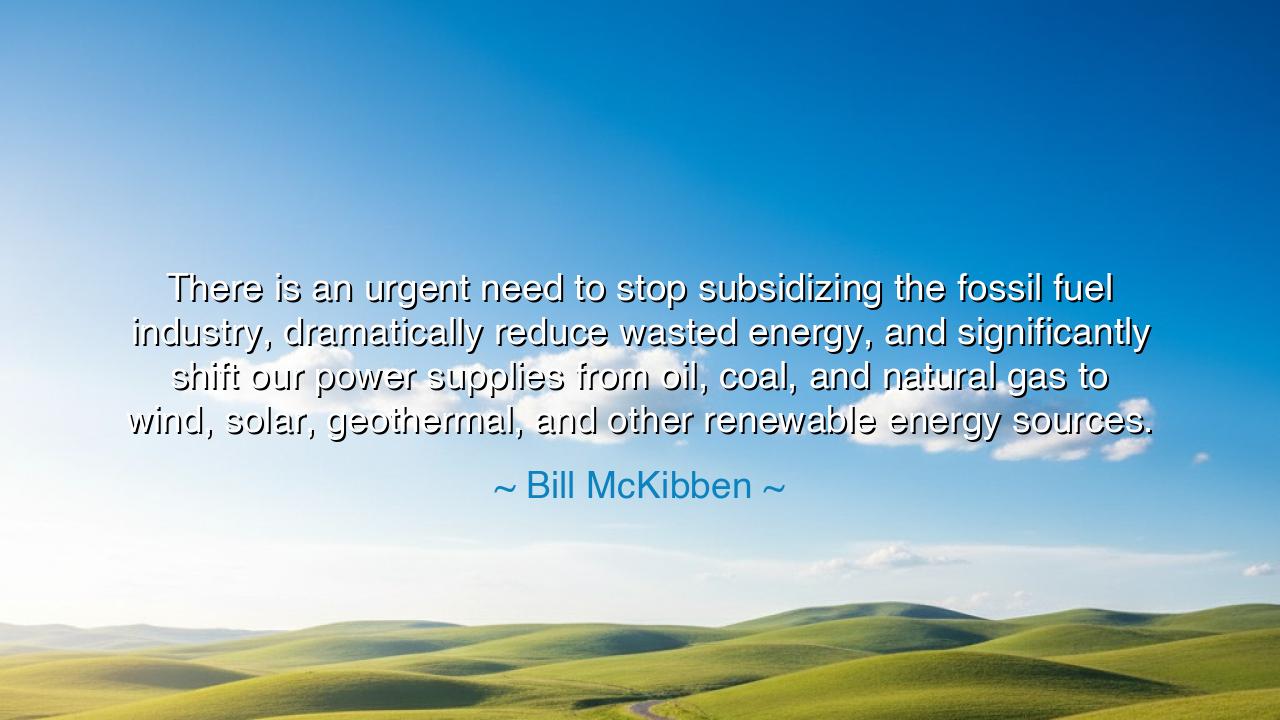
There is an urgent need to stop subsidizing the fossil fuel
There is an urgent need to stop subsidizing the fossil fuel industry, dramatically reduce wasted energy, and significantly shift our power supplies from oil, coal, and natural gas to wind, solar, geothermal, and other renewable energy sources.






Bill McKibben, prophet of the earth and herald of the climate struggle, declares with urgency: “There is an urgent need to stop subsidizing the fossil fuel industry, dramatically reduce wasted energy, and significantly shift our power supplies from oil, coal, and natural gas to wind, solar, geothermal, and other renewable energy sources.” In this cry resounds the wisdom of one who sees not only the peril of the present, but the destiny of generations yet unborn. He speaks as one calling his people from a house ablaze, urging them to flee destruction and embrace the renewable strength of the earth’s own gifts.
The ancients themselves revered the balance of nature. The Greeks told of Prometheus, who brought fire to men as a blessing, yet warned that fire unchecked could devour. So too do oil, coal, and natural gas, though once blessings of industry, now scorch the earth and darken the skies. McKibben’s words call us back to the harmony that our forebears dimly glimpsed: to live by the wind, the sun, the geothermal fires, not as plunderers but as stewards of creation.
History gives us lessons in the folly of waste and the wisdom of renewal. When the forests of Easter Island were cut without restraint, the people were left barren, unable to build, to sail, or to thrive. Their collapse stands as a warning to all who consume without foresight. In contrast, nations that turned early to renewable energy, such as Iceland with its geothermal power, have shown how wisdom and courage can free a people from dependence on that which destroys.
McKibben also unmasks the injustice of subsidizing fossil fuels—feeding wealth into the very engines of ruin while neglecting the rising dawn of clean power. He reminds us that this is not only a question of science, but of morality. To cling to coal and oil when the earth trembles with droughts, floods, and fires is to choose blindness over sight, bondage over freedom. To invest in renewable energy is to sow seeds of hope, to honor both the planet and the children who will inherit it.
Let this be the teaching for future generations: that the wisdom of an age is not measured by its power to consume, but by its power to sustain. To shift from the darkness of fossil fire to the brilliance of sun and wind is not merely policy, but destiny. The call is urgent, the choice is clear: either remain chained to the past and perish in its ashes, or rise with courage and embrace the eternal gifts of the earth. For the one who chooses renewal chooses life itself.






XBvuong xuan bach
This statement provokes reflection on global climate policy. Even if one country aggressively shifts to renewables and cuts fossil fuel subsidies, how effective will that be if other nations continue their current energy practices? I’m curious about the role of international agreements and enforcement mechanisms in driving coordinated action. Additionally, how can public awareness, corporate responsibility, and grassroots activism influence governments to implement these urgent energy reforms on a large scale?
SSSen Sen
Reading this, I’m intrigued by the technological aspects of the energy transition. Are current renewable technologies—like wind, solar, and geothermal—capable of fully meeting global energy demands, or is there a risk of shortages or reliability issues? How can storage solutions, grid improvements, and innovations in energy efficiency be scaled up to complement renewable power? I also wonder how investment in research and development could accelerate the shift while maintaining energy stability.
D1Nguyen Thao Duyen 11D3
This makes me wonder about the role of individual behavior versus systemic change. While reducing wasted energy and supporting renewables is critical, how much impact can personal actions have if governments and corporations continue to prioritize fossil fuels? I’m also curious about potential resistance from entrenched energy interests and the political challenges involved in reallocating subsidies toward sustainable alternatives. What incentives or policies could realistically accelerate this transition?
HNNguyen Hai Nam
I’m concerned about the social and economic consequences of transitioning too quickly from fossil fuels to renewable energy. How do we balance the urgent need to reduce emissions with the livelihoods of workers and communities dependent on fossil fuel industries? Additionally, what strategies can ensure that energy access remains equitable during this transition, especially in developing countries where infrastructure is less developed and energy demand is rapidly growing?
XQXuan Quang
This statement raises urgent questions about political will and economic feasibility. How realistic is it for governments to remove subsidies from powerful fossil fuel industries without causing major economic disruption? I’m also curious about the pace at which renewable energy infrastructure can realistically replace fossil fuels. Are current policies and technological developments sufficient to meet this shift, or do we need radical innovation and international cooperation to achieve meaningful results?